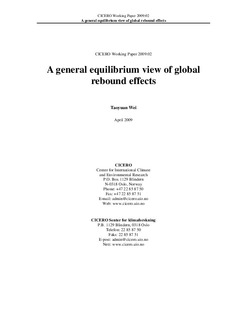| dc.contributor.author | Wei, Taoyuan | nb_NO |
| dc.date.accessioned | 2014-03-17T14:31:12Z | |
| dc.date.available | 2014-03-17T14:31:12Z | |
| dc.date.issued | 2009 | nb_NO |
| dc.identifier.issn | 0504-452X | nb_NO |
| dc.identifier.uri | http://hdl.handle.net/11250/192224 | |
| dc.description.abstract | How do energy efficiency gains affect energy consumption? The effects are generally called "rebound effects" in the literature. Previous studies have extensively focused on only part of the global economy to study rebound effects, e.g. energy consumption by households, one industry, or one country. However, since the global economy is highly connected among countries, these studies may lead to misleading conclusions if the rebound effects in the rest of the economy are signifficant. Recently Saunders (2008) analyses the demand side by taking the global economy as a whole. Wei (2007) also provides a general analysis by using Cobb-Douglas production functions for the global economy. The present article expands Wei (2007)'s general analysis to explore the rebound effects from an economist's viewpoint by taking the global economy as a whole and applying general forms of production functions. The analysis provides new insights related to rebound effects. For example, we highlight the role of energy supply as a determinant of rebound and we predict that long term rebound may be lower than short term rebound. | nb_NO |
| dc.language.iso | eng | nb_NO |
| dc.publisher | CICERO Center for International Climate and Environmental Research - Oslo | nb_NO |
| dc.relation.ispartof | CICERO Working Paper | nb_NO |
| dc.relation.ispartofseries | CICERO Working Paper;2009:02 | nb_NO |
| dc.title | A general equilibrium view of global rebound effects | nb_NO |
| dc.type | Working paper | nb_NO |
| dc.source.pagenumber | 35 | nb_NO |
| dc.identifier.cristin | 349623 | |
